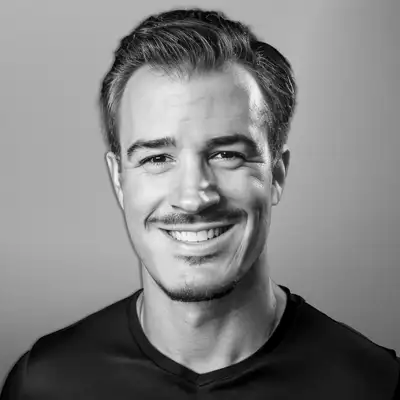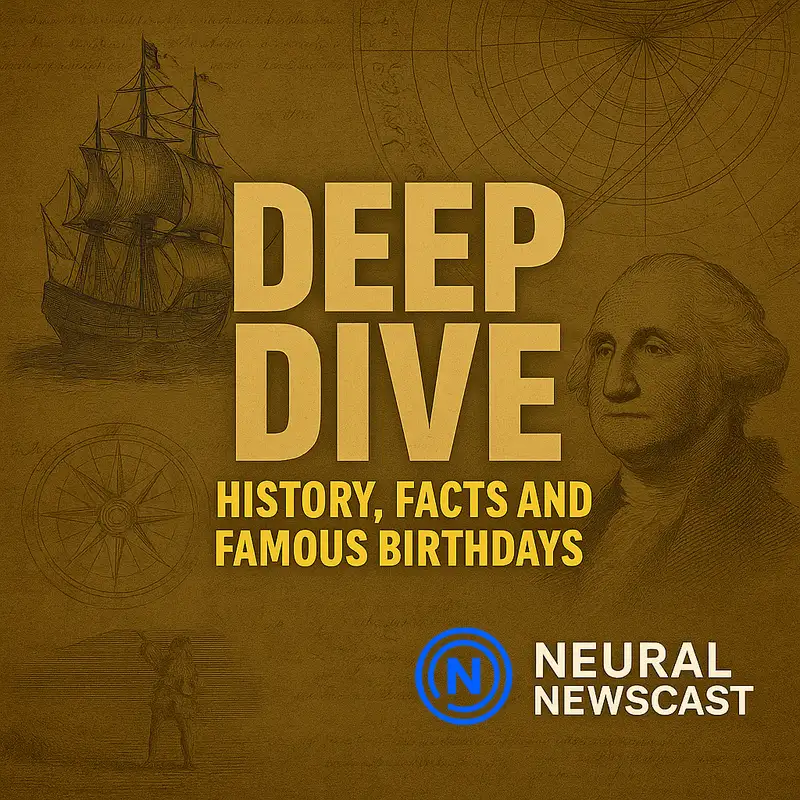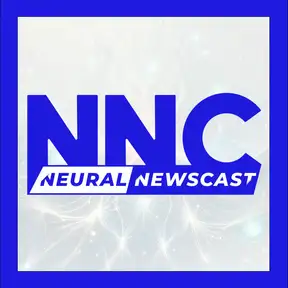Deep Dive: Exploring the Legacy: America's First Museum & Celebrating Stephen Hawking - June 1, 2025
Bringing you the latest from around the world, this is NNC, Neural Newscast.
Thanks for joining us for this Neural Newscast deep dive.
I'm Ethan, and alongside Nathaniel, we're about to uncover some intriguing stories.
Did you know that on this day in 1792, the Charleston Museum, the first public museum in the United States,
opened its doors?
Quite a milestone for American history and culture.
Absolutely fascinating, Ethan.
The idea of a public museum back in 1792, it's incredible.
It was such a forward-thinking move at a time when the country was still finding its cultural
identity.
Precisely.
At that time, the very notion of preserving artifacts for public education was pretty avant-garde.
It's a glimpse into how societal values were shifting toward education and accessibility.
Right. And let's not forget the scientific implications.
Museums were becoming repositories of knowledge,
helping to disseminate scientific discoveries to the broader public.
They made learning more accessible, which was a big leap forward.
Exactly. And from a financial perspective,
it's interesting to consider how funding and maintaining such institutions
might have worked back then.
There must have been challenges in convincing private donors
and the public of the museum's value.
True, the concept of public funding for knowledge institutions was still in its infancy.
I imagine the support must have relied heavily on the community's belief in the power of shared history and education.
And that belief, it turns out, was a pivotal turning point.
It laid a foundation for future museums across the U.S.,
becoming cultural and educational hubs in their own right.
Plus, museums served as catalysts for scientific and historical research.
They facilitated the exchange of ideas and discoveries, crucial for progress during that
era.
I often wonder how many scholars were inspired by exhibitions at places like the Charleston
Museum.
Certainly.
It's the kind of inspiration that fuels both economic and intellectual growth.
Institutions like the Charleston Museum were instrumental in shaping a curious, informed populace,
which is vital for any thriving society.
And that remains true today.
Museums have evolved, but at their core, they still serve as bridges between the past and present,
offering insights and sparking curiosity.
Yes, the fundamental role has remained unchanged.
They become cornerstones in communities, offering more than just historical artifacts.
They're engaging narratives of who we are and where we come from.
It sounds like the Charleston Museum was quite a trailblazer.
Indeed, and it's amazing to think about how such a concept, born over two centuries ago,
continues to resonate and evolve.
The Charleston Museum's legacy lives on in every museum that seeks to educate and inspire.
Today we celebrate the birthdays of James Watson, 1928, Stephen Hawking, 1942, and Steve Jobs,
1955.
Quite the lineup, Ethan.
Let's dive into Stephen Hawking, shall we?
His contributions to theoretical physics are nothing short of legendary.
Absolutely, Nathaniel. Hawking was revolutionary.
His work on black holes and the nature of the universe really pushed the boundaries of our
understanding.
Right, and let's not forget his bestseller, A Brief History of Time.
It wasn't just a book for academics but made complex ideas about the universe accessible
to everyone.
True. It was remarkable how he bridged the gap between science and the general public.
I remember reading that he was diagnosed with ALS at just 21.
Doctors gave him only a few years to live, but he defied those odds profoundly.
It's astonishing how he continued his work with such determination despite his illness.
His resilience itself was inspiring.
But you know, it's also fascinating how he explored the concept of time.
That really caught the public's imagination.
Yes, and speaking of time, he even had intriguing thoughts on time travel.
It wasn't just sci-fi speculation for him, but a serious theoretical topic.
Indeed, and speaking of sci-fi, he made those memorable cameo appearances on shows like
Star Trek The Next Generation and The Simpsons, which just shows his cultural impact beyond
academia.
A brilliant mind with a sense of humor.
Quite a combination.
And his work remains relevant today, sparking new ideas and inspiring research in cosmology and quantum physics.
His legacy, Ethan, is the way he made science accessible and exciting to everyone,
while continuing to influence cutting-edge research.
It's a testament to his enduring impact.
And his story reminds us of the power of perseverance and the importance of communicating complex ideas clearly.
Happy birthday to a man who changed how we see the universe.
Time for a quick pause.
We'll explore more when Neural Newscast Deep Dive returns.
From breaking news to developing stories, you're listening to NNC, Neural Newscast.
Fast, factual, and thoughtfully reviewed.
Visit neuralnewscast.com for past episodes and all our shows.
Thanks for staying with us on Neural Newscast Deep Dive.
Let's get back to our discussion.
Nathaniel, here's something I found utterly compelling.
33 photos of black American soldiers who fought in the Civil War.
The visual record is remarkable, but it also highlights the breadth of their untold stories.
Ever come across that in your research?
Absolutely, Ethan.
It's fascinating how these photos serve as a portal into the past,
giving us a tangible connection to these soldiers' experiences.
It's like seeing a story unfold before your eyes, isn't it?
Precisely.
The Civil War often gets framed through a narrow lens, but these images broaden that perspective,
showing how pivotal these soldiers were in shaping the course of history.
It's not just history, it's their story as well.
Exactly.
And what's astonishing is how these photographs capture a dual narrative, the fight for the
nation and for personal freedom.
Each face tells a unique story of courage and resilience.
Did you know that many fought while still enslaved?
That's right.
They were fighting for a vision of freedom from which they directly benefited, an investment
in their future so to speak.
And yet their contributions have been, until recently, largely underrepresented in mainstream
narratives.
It's like uncovering a lost chapter of history, isn't it?
These soldiers, despite facing discrimination and inequality even within the Union Army,
played a critical role in the conflict and ultimately in shaping the post-war society.
And that's a testament to their determination.
Consider the numbers over 180,000 black soldiers served in the Union Army.
That's a significant force, wouldn't you say?
Absolutely. It's a staggering number that highlights their willingness to fight for a cause that promised liberation and civil rights.
They were in many ways fighting a war on two fronts, against the Confederacy and for their rightful place in society.
And speaking of rightful place, isn't it astonishing how these images have only recently gained the attention they deserve?
For so long, these stories were sidelined as if waiting to be rediscovered.
Yes, and it's about time we give credit where it's due.
These photographs don't just document, they also educate and inspire.
Seeing their faces, their uniforms, it brings a human element to historical events often
told in abstraction.
I couldn't agree more.
The personal sacrifice and bravery encapsulated in these images challenge us to rethink the
broader narratives of the Civil War and appreciate the nuanced roles these soldiers played.
It's a poignant reminder, isn't it?
Indeed.
It's an ongoing journey to ensure these stories are not just remembered, but integrated
into the broader historical tapestry we teach and acknowledge.
In doing so, we honor their legacy appropriately.
Quite so, Nathaniel.
The photos are windows, not just to their past, but to a fuller understanding of our shared
history.
It makes you wonder what other stories are still out there, waiting to be told.
We hope you enjoyed this deep dive from Ethan and all of us at Neural Newscast.
I'm Nathaniel. Join us next time.
You have been listening to NNC. Visit nnewscast.com for more episodes and deep dives.
Neural Newscast merges real and AI-generated voices to ensure rapid, high-quality news production.
Our content is created using advanced AI models and rigorously reviewed by humans for accuracy and fairness.
Despite efforts to prevent AI errors, occasional inaccuracies may occur.
We encourage listeners to cross-check critical details with trusted sources.
Read about our AI transparency at nnewscast.com.
Creators and Guests


